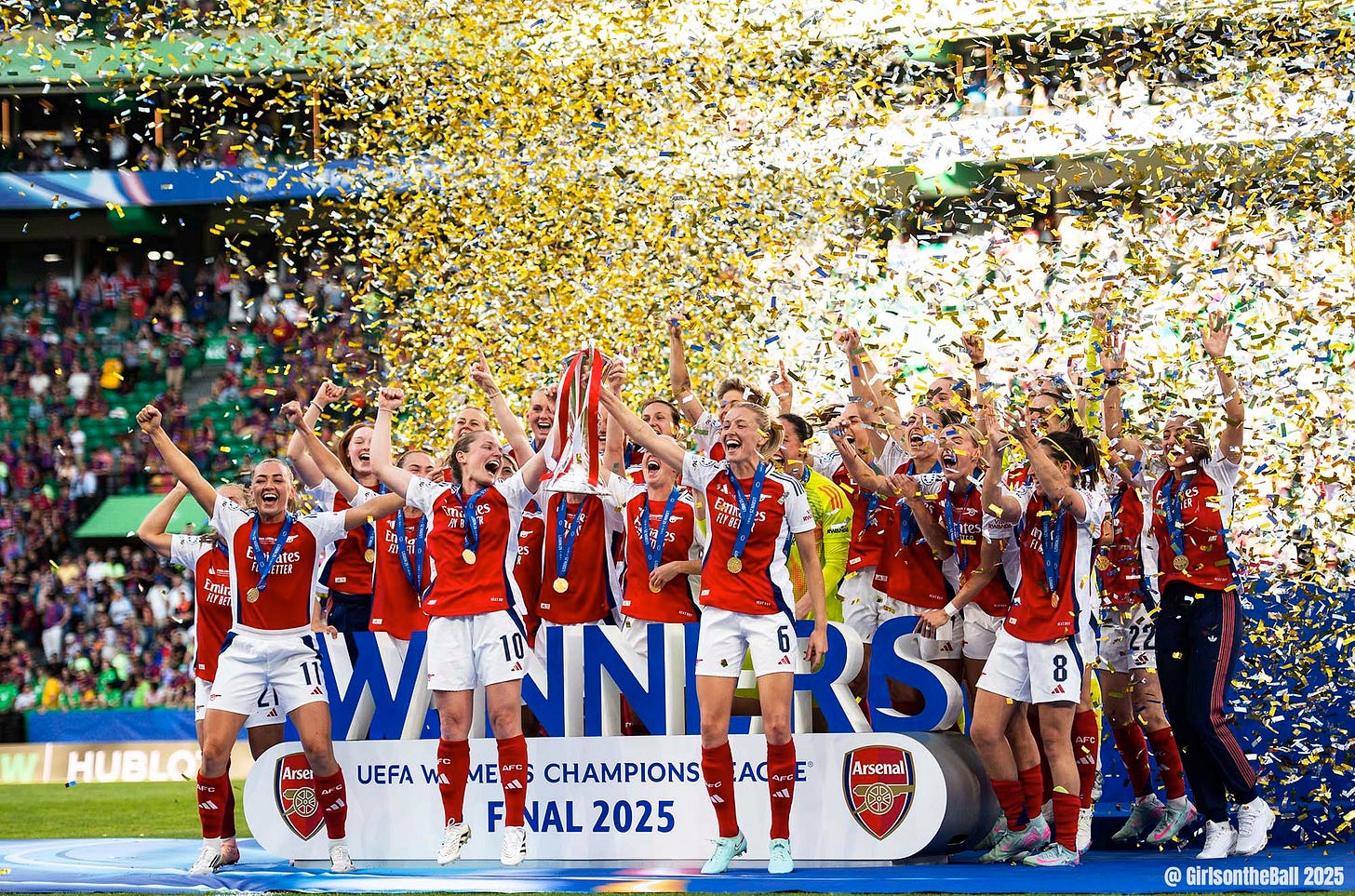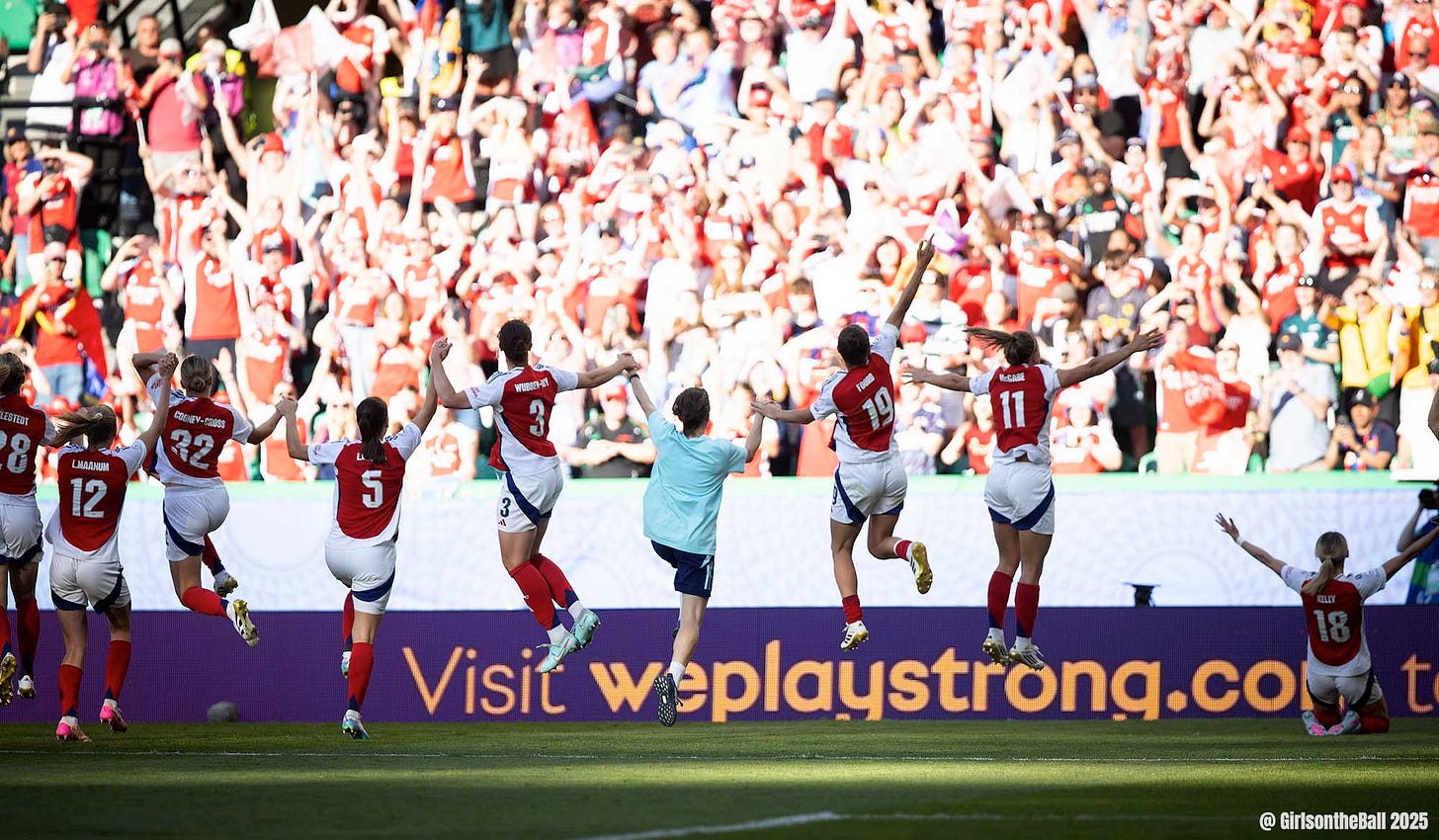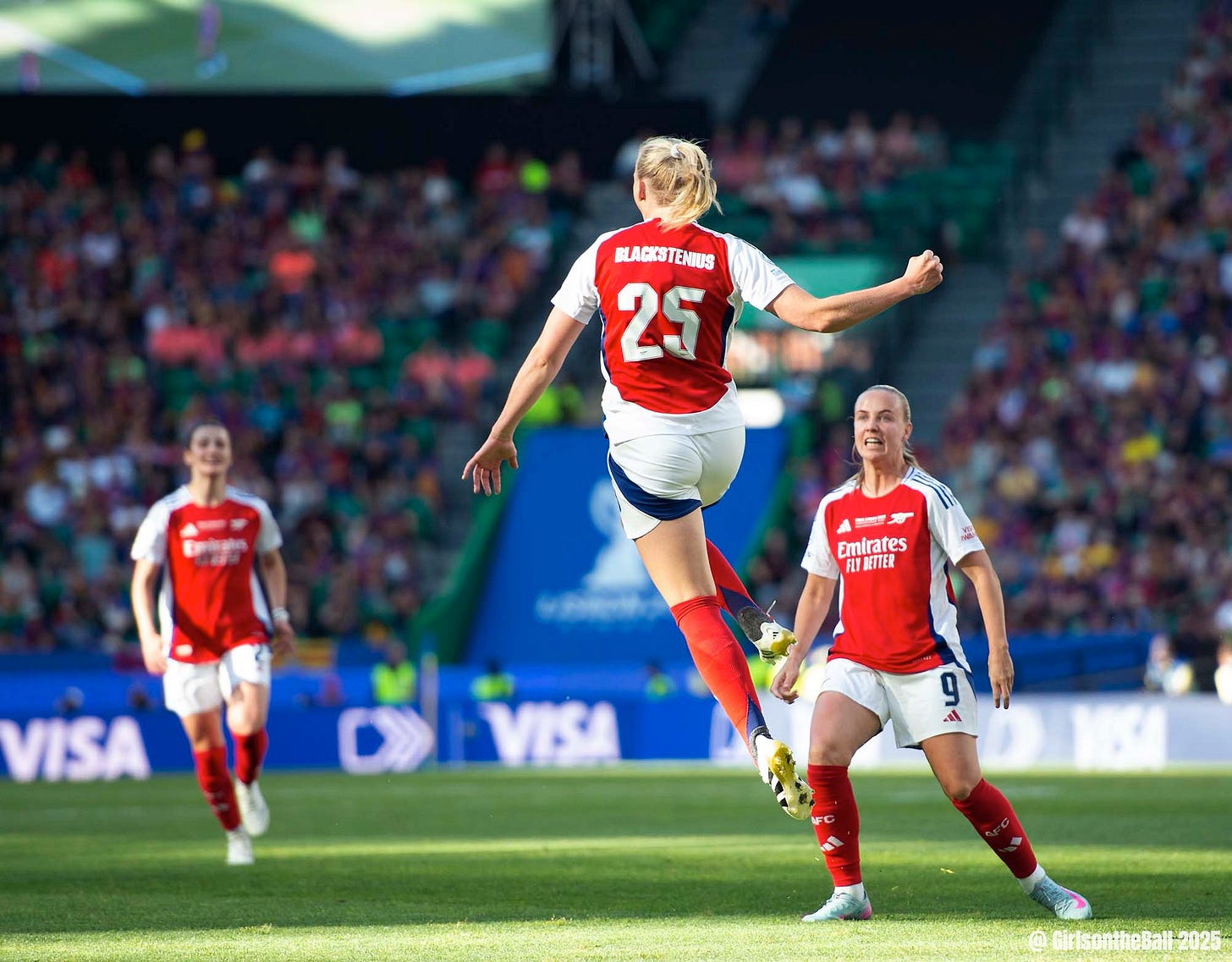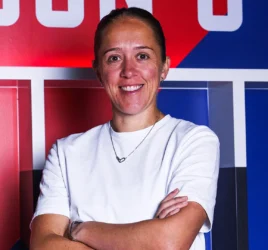On Saturday in Lisbon, Arsenal defeated Barcelona to win their first Champions League title in 18 years, completing a journey that started in Round 2 qualification.
At 18:55 on Saturday evening, the tension inside the Estádio José Alvalade was palpable. Forlorn Barcelona fans were urging their team on with anguished shouts, desperately hoping they could muster a leveller from somewhere, anywhere. In the corner decked in red and white, almost 5,000 people could hardly watch, barely able to believe what was happening in front of them.
And then the whistle blew and the jubilation erupted. It was like a balloon had been popped and all for the emotion burst out. Limbs everywhere, hugs, dancing, endless tears flowed across the pitch and into the stands. Leah Williamson, Kim Little and Lia Wälti collapsed in a pile in the middle of the turf. Renée Slegers, the architect of it all, literally leapt into the arms of her coaching team, the disbelief etched across her face. Kelly Smith, probably Arsenal’s greatest ever player and now assistant manager, turned to the fans and let out a guttural roar whilst clinging tightly to the badge, rolling back the years to her celebrations of old. On the other side, the camera panned to the Barcelona team standing there shell-shocked, unsure of exactly how they had just been outdone by the plucky newcomers to this stage, the one they have dominated so frequently in recent years.
If football did fairytales, Arsenal’s Champions League journey this season would be it. The setbacks, the comebacks, the change of manager, the individual successes and heartbreaks all combined to write the perfect script for this squad to end their 18-year wait and bring the trophy back to North London once again.

Despite overcoming Bayern Munich, Real Madrid and eight-times champions Lyon on the path to the final, few reckoned they could do it against Pere Romeu’s all-conquering Barcelona, widely considered as one step too far in their journey. The Spanish champions had swept aside Wolfsburg and Chelsea in the knock-out stages with ease, two sides with far more experience at this stage of European competition in recent years.
There was no lack of conviction in this playing group, however, who across the course of the last eight months have developed a confidence and grit about them, an ability to believe the unbelievable. Lina Hurtig’s dramatic late goal against Juventus at the Emirates that saw them qualify for the quarter-finals. Mariona Caldentey’s 86th minute penalty against Bayern Munich that sealed top spot in the group. The stunning second half performance at home against Real Madrid that overturned a 2-0 deficit. And then the semi-final in Lyon that saw them sweep aside the former eight-time European champions to book their spot in the Final. These moments were all ingredients for the eventual recipe that came to the boil in Lisbon.
The master chef in charge of it all was, Renée Slegers. Just eight months ago, few would have known much about the 36-year-old before she was thrust into the limelight with the departure of Jonas Eidevall in October. Calm and unassuming, the Dutch coach appears to have taken it all in her stride, keeping hers and her players’ feet firmly on the ground every step of the way. Staying “humble” has been her mantra throughout and even when things haven’t gone their way – conceding 12 in their last three league games, for example – she stuck to her guns and found a way. She made sure her players believed that she was truly one of them, a leader who would empower, motivate, guide and protect them throughout. One for whom they would be willing to run through a brick wall for and to reach the end of their physical limits to get the job done.

It was Chloe Kelly who said it best. The England international had found herself out in the cold at Manchester City and England in the first part of the season, but a loan move back to Arsenal has proved career-changing. “As soon as I stepped foot in this club, I found happiness,” she said. “As soon as Renée got on the phone to me to give me the opportunity to represent this badge, I wanted to repay her. From being in such a dark place to now, it’s crazy.”
This was how Sunday came to be. As Kim Little said post-match, they knew they “had to be basically perfect” on the day and they all but practically were. They were never going to possess more of the ball but, from the first minute, they got in Barcelona’s faces, the press of the front three replicated across the team.
They did not park the bus but were compact out of possession, packing the central areas and forcing Barcelona to occupy wider positions with Kelly and Caitlin Foord tirelessly tracking back. A superb block in the box from the latter on Fridolina Rolfö set the tone, as did the defensive play of the entire backline who did not commit a single foul all game. Leah Williamson had the performance of her career – it seemed like the whole game and Barcelona were moving in slow motion for the England captain, allowing her to read moves with ease and get any body part in the way. Steph Catley was imperious in the box and her crucial early block to deny Aitana Bonmatí was a stand-out. Katie McCabe and Emily Fox too were indefatigable at full-back. On reflection, it might go down as one of the best defensive displays in the history of the competition.

It was tough and tiring and Barcelona grew into the game in the second half. Claudia Pina clipping the woodwork was a warning sign but it was not long before Slegers played her aces – Stina Blackstenius and Beth Mead. Spanish defender Irene Paredes has never been comfortable with direct forwards. Add to this the fact that she had picked up a booking and the Arsenal manager knew that it was time to strike. The holders’ defence was instantly rattled and the winner came just seven minutes later, with Mead’s intelligent pass setting up Blackstenius to fire home. It is fair to say that the Swede has not had the most consistent time of it in an Arsenal shirt but once again she stepped up when it mattered to win them one of the most coveted titles in the game.
This was a performance based on blood, sweat and tears. Every sinew was stretched; every last ounce of energy used. Arsenal just wanted it more than their opponents and found that extra gear when there seemed to be nothing left. Within that were the individual narratives – Kelly’s redemption; Mead’s grief; Kim Little; and Williamson, the Arsenal kid who had a dream of lifting this trophy with her team – all of them giving individuals another level. “I think right now, I’m the happiest I have been in my whole entire life and I hope that other Arsenal fans are because I know I lived a dream,” she said. “I never take it for granted.”
The celebrations that followed were equally emphatic, culminating in Monday’s trophy lift in front of 10,000 outside the Emirates’ iconic Armoury. It was the first time a domestic club has held such a celebration for their women’s team in England, one that was exclusively theirs and not added on to that of the men. For anyone there, it was a day full of emotion and celebration. A sign that not just Arsenal, but the whole of women’s football, has hit a level that at one point, not too long ago, never felt possible. “My career has gone along with women’s football in terms of its rise,” Catley reflected. “Being there from the very start when we were just playing in front of family and friends and a couple of others, and now we’re here. It’s going from strength to strength and it’s lovely to see. There’s still so far to go. The quality of the football and the players that are coming through, the sky is the limit.”


